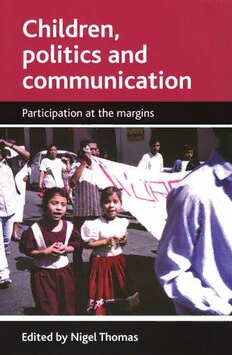Download Children, Politics and Communication: Participation at the margins PDF Free - Full Version
Download Children, Politics and Communication: Participation at the margins by Nigel Thomas in PDF format completely FREE. No registration required, no payment needed. Get instant access to this valuable resource on PDFdrive.to!
About Children, Politics and Communication: Participation at the margins
Even after 20 years of children's rights and new thinking about childhood, children are still frequently seen as apolitical. All over the world there has been a growing emphasis on 'participation', but much of this is adult-led, and spaces for children's individual and collective autonomy are restricted. "Children, Politics and Communication" questions many of the conventional ways in which children are perceived. It focuses on the politics of children's communication in two senses: children as political actors and the micro-politics of children's interaction with each other and with adults. It is about how children and young people communicate and engage, how they organise themselves and their lives, and how they deal with conflict in their relationships and the world around them. These are children at the margins - in communities in revolt in rural Mexico, growing up in Chinese families in England, isolated at home with ME, living under occupation in Palestine, negotiating their way through the UK asylum system. But they are not victims; these are children taking charge of their lives - running 'kid's clubs' in Nepal, linking with each other on websites, learning to manage disagreements, defending their national identity. The book is also about adults and how they can interact effectively with children and young people, both on an individual and societal level, in ways that are sensitive to their feelings and empowering and supportive of their attempts to be autonomous. With international contributions from a range of different disciplines, "Children, Politics and Communication" is timely and relevant for policy makers, practitioners and researchers engaging with children and young people.
Detailed Information
| Author: | Nigel Thomas |
|---|---|
| Publication Year: | 2009 |
| ISBN: | 9781847421845 |
| Pages: | 216 |
| Language: | English |
| File Size: | 1.89 |
| Format: | |
| Price: | FREE |
Safe & Secure Download - No registration required
Why Choose PDFdrive for Your Free Children, Politics and Communication: Participation at the margins Download?
- 100% Free: No hidden fees or subscriptions required for one book every day.
- No Registration: Immediate access is available without creating accounts for one book every day.
- Safe and Secure: Clean downloads without malware or viruses
- Multiple Formats: PDF, MOBI, Mpub,... optimized for all devices
- Educational Resource: Supporting knowledge sharing and learning
Frequently Asked Questions
Is it really free to download Children, Politics and Communication: Participation at the margins PDF?
Yes, on https://PDFdrive.to you can download Children, Politics and Communication: Participation at the margins by Nigel Thomas completely free. We don't require any payment, subscription, or registration to access this PDF file. For 3 books every day.
How can I read Children, Politics and Communication: Participation at the margins on my mobile device?
After downloading Children, Politics and Communication: Participation at the margins PDF, you can open it with any PDF reader app on your phone or tablet. We recommend using Adobe Acrobat Reader, Apple Books, or Google Play Books for the best reading experience.
Is this the full version of Children, Politics and Communication: Participation at the margins?
Yes, this is the complete PDF version of Children, Politics and Communication: Participation at the margins by Nigel Thomas. You will be able to read the entire content as in the printed version without missing any pages.
Is it legal to download Children, Politics and Communication: Participation at the margins PDF for free?
https://PDFdrive.to provides links to free educational resources available online. We do not store any files on our servers. Please be aware of copyright laws in your country before downloading.
The materials shared are intended for research, educational, and personal use in accordance with fair use principles.

